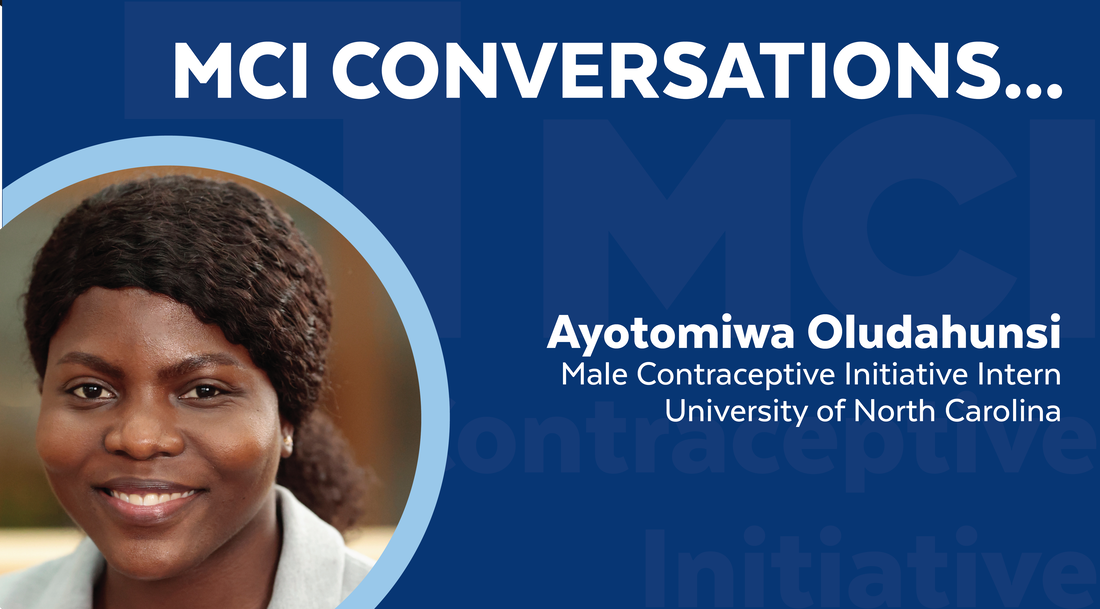|
Our most recent MCI Fellow Ayotomiwa Oludahunsi sat down with us to discuss her interest in male contraception and motivation in her work. This blog post shares highlights from that conversation. What do you think about male contraception? I think male contraception is a means to promote reproductive decision-making among men and improve fertility and reproductive outcomes for individuals, families, and societies. It could create an opportunity to explore facilities that foster sexual and reproductive health. This is integral in the early detection of some medical conditions during medical assessment before using some male methods, thereby enhancing a healthier population. What motivated you to work at MCI? What did you accomplish/work on at MCI? My background in the health sector in Nigeria opened my eyes to the importance of family planning and male contraception to attain a healthy family planning journey among males, females, families, communities, and nations. At my workplace, I observed that a large number of women present at the family planning clinics compared with men. I was puzzled and wondered what the barriers could be; culture, perception, or lack of multiple options/resources for men. Seeing a vast population in dire need of family planning education and with limited/no knowledge of male contraception, I was inspired to carry out a project or work with an organization whose mission is to tackle this pressing issue. I was excited at the opportunity to work with an organization that not only promotes family planning through advocacy, social media, and research but is wholly immersed in male contraception both domestically and globally, which I found in MCI. Throughout my time at MCI, I worked on the development of a market research module, adapted from an existing market research, which is integral in understanding people’s perspectives on the interest and uptake of male contraceptives and therefore creating educational and research materials about male contraception accessible to the public. The newly adopted, simplified module will allow newer, younger researchers the ability to conduct small-scale market research in their communities, contributing to MCI’s knowledge base and learning market research skills. In addition, I developed a directory to identify and connect with potential stakeholders domestically and internationally to build coalition and further contraceptive programs and interventions. I was opportune to gain mentorship and engage in training and intervention programs and will utilize the knowledge and skills gained to achieve my professional goals. What are some things that you wish everyone knew about male contraception? The development and utilization of male contraception is one of the crucial steps to achieving sustainable development goals, thereby creating a better life for individuals, communities, and nations at this time and for future generations. I believe everyone is scared to try “new” things. These methods have some side effects, but the advantages are more, which people forget/neglect exists. However, we all need to learn about male contraception and educate others about it, our partners, colleague, neighbors, etc. This initiates a chain of communication and curiosity among individuals and the involvement with research and programs fostering male contraception and its impact at large. What impact do you think new male methods of contraception will have on the world? I think new male methods will provide a great opportunity for males to explore more options than ever before and have greater control over their own reproduction, and choose methods that really work for them, working with their partners on making a decision since there is a variety. These would also reduce the burden of unplanned pregnancies, poor maternal and infant outcomes, and change in reproductive decision-making. These methods will aid in overcoming barriers to contraception due to an increase in their availability and accessibility, especially in low and middle-income countries faced with this burden. I think all of these are necessary to promote positive sexual and reproductive health outcomes and meet the needs of adolescents, young adults, and families from diverse populations across the globe. Want to lend your voice to the conversation? Reach out to us and share your thoughts today!
0 Comments
Your comment will be posted after it is approved.
Leave a Reply. |
Categories
All
Archives
June 2024
|
|
|
Donate to Male Contraceptive InitiativeYour generous donation makes a difference!
|
© Male Contraceptive Initiative. All rights reserved.


 RSS Feed
RSS Feed
